The Atrocious Music Collection: #8 in a series
Artist: Don Johnson (b. 1949)
Album Title: Heartbeat
Category: Celebrity (Soulless division)Year: 1986
Cover art style: Hotel Art
Audio samples: Acquisition: Princeton Record Exchange, Princeton, NJ, circa 1990, 99 cents!
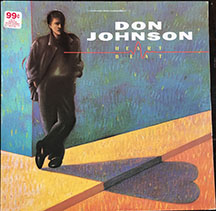
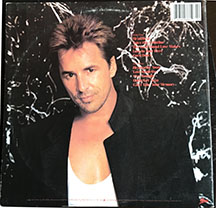
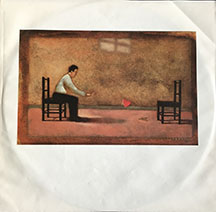
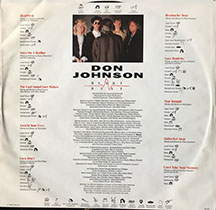
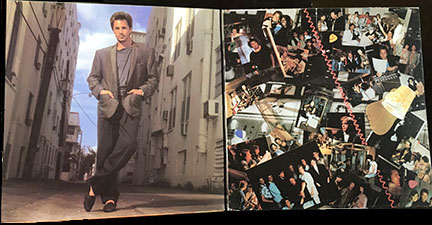
Click on pictures for full-sized images
In the movie Ed Wood, there is a fictional meeting between two real people, Ed Wood and Orson Welles, who share the same passion for making movies, the same obstacles to realizing their artistic vision, and the same dedication to the integrity of that vision. What separates the two is ability. Ed Wood canít write a logical script or believable dialog. He canít direct and his actors can barely act. His special effects are laughable. But, just like Orson Welles, Wood is completely sincere about what he is doing. He believes in it, body and soul.
And that is what makes the best Atrocious Art: the combination of dedicated sincerity with a lack of ability (or, if you prefer, talent). Which is why Don Johnsonís album Heartbeat is really no fun to listen to. Unlike truly enjoyable Atrocious Music, Johnsonís hyper-commercial product stinks of a safe, corporate, planned-for-cautiousness on every track.
Heartbeat was made possible because of the success of the NBC TV show Johnson starred in, Miami Vice (1984-1989). Johnson, playing Crockett, was the pretty one, the visual centerpiece, as slick and good looking his co-star, the city of Miami (apologies to Philip Michael Thomas.)
The show spawned a TV-sized version of the movie product tie-ins that had begun with Star Wars. Mostly this had to do with clothes, such as After Sixís Miami Vice dinner jackets. Crockettís permanent 5-oíclock shadow even gave rise to a shaver you could buy which would give you the same casual devil-may-care look when you left the house in the morningÖ or afternoon or whenever. It was called the Miami Device.
The album, therefore, is simply an extension of the showís commercialism. The packaging is slick and soulless. Note the double-album-like foldout, even though the record is a single disc. To ensure its success, a healthy stable of well-known guest artists appear: Stevie Ray Vaughan, Ron Wood, Dweezil Zappa, Bonnie Raitt, and Willie Nelson. Altogether, there are some 33 musicians playing on the various tracks, and there are some 16 different songwriters, including Tom Petty and Bob Segar. So, the fans of any of these high-end guests can be added to the target market of Vice fans to boost sales, regardless of the actual music.
Johnson achieved his marketing goal, too. The album reached #17 in the US and the song Heartbeat reached #5. We need to tip our hat to his success here, but with the understanding that the TV show gave him a huge head start. And before going on, we need to acknowledge that Don Johnson himself is the co-writer on two tracks, one of which is delightfully titled Love Roulette (Falling in love can be dangerous/ Make you crazy, playing love roulette). Credit where credit is due.
(However, when Johnson sings the game was only made for two, does he mean falling in love is only made for two and has an element of chance, like making a bet in roulette, even though roulette can be played by more than two, and, in fact, is a game in which everyone plays against the house, which, as a metaphor for love between two people, is a pretty weird metaphor, like a bunch of people all vying for the love of a corporate entity, or perhaps a single person, like in those Bachelor/Bachelorette TV shows, or does he mean that falling in love is like Russian roulette, which is often played with just two people, but which also has a whole bunch of different issues vis-ŗ-vis being a metaphor for falling in love? Iím honestly asking, here.)
Having said that, this is simply a hard album to listen to. Almost every song has a non-descript 1980ís quality. The songs sound so stereotypical they fall out of the memory almost as soon as they end, even though the choruses are pounded home through endless repetitions and fadeouts Ė so many fadeouts. Long fadeouts. The lack of memorable music meant I needed to really re-listen to this record. Beyond recalling it was pretty terrible, I had no memory of the music, and even on re-listening, I found I had forgotten a track three tracks later, and had to go back and listen again.
Heartbeat, the hit from the album, is just pure pop poop (or insert a stronger word). Voice on the Hotline might contain every 80ís clichť in the book. Itís got the 80ís gated drums, soulless yet sexy female backup singers, soprano sax imitating Kenny G, 80ís synths, and lyrics that I think are referring to 80ís datelines and other 900-hotlines that mostly died away post-internet.
Iím not sure what is The Last Sound Love Makes, even after listening to this song, but Iím pretty sure this song is the last sound love heard before it died. (Too flippant?) The big drum 80ís ballad Heartache Away sounds like a spoof of big drum 80ís ballads, and includes the lyric Iím giving you up/and itís getting me down, which contends for the "Most Vapid Lyric on This Record" Award.
The Tom Petty song, Lost in Your Eyes, is actually a bit painful to listen to, with Johnsonís voice squeezing out some of the ďbigĒ moments in a way that suggests his voice is not up to it (because it is not). And this is clearly not Pettyís best work. The song Coco Donít may refer to what you say if Coco tries to play this track. (Yes, I know, too flippant, but what else can be said about this song?)
Johnson co-wrote the final song, Canít Take Your Memory. Itís a piano ballad, which might have been a bit bittersweet in someone elseís hands. Honestly, the bones of this are ok. But the executionÖ oy. The piano is a heavily processed synth piano, Johnsonís voice sits in a pool of reverb, and crappy synth strings enter after two verses. Like the entire album, this song lives deep in Over-Processed-vania.
Star Tonight is easily the best thing on the record. A Bob Segar penned song with Willie Nelson assisting on vocals Ė or really with Willie Nelson on vocals being assisted by Don Johnson. And maybe, as a result, thereís a hint of something real and honest. Segar tends to shoot straight, and Willie could make a Taco Bell menu sound authentic.
To his credit, Johnsonís voice is adequate to the task of singing these songs. In the days before pitch correction, it has to be said he doesnít embarrass himself, even if his voice lacks any special characteristic. With a few exceptions that arenít worth wading through the whole record to find, his vocals are professional and so ultimately joyless.
Pretty much like everything else here.
